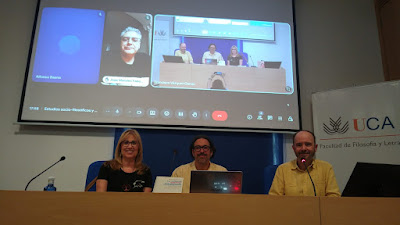
El pasado viernes 20 de junio a las 11h. en el Salón de Grados de la Facultad de Filosofía y Letras (Universidad de Cádiz) ha tenido lugar el acto de defensa de la tesis doctoral de José Berasaluce Linares, miembro del grupo HUM-536, titulada Relaciones de poder en la gastronomía española contemporánea, dirigida por Francisco Vázquez García. El tribunal fue presidido por el catedrático de antropología social de la Universidad Oberta de Catalunya, Francisco Xavier Medina Luque, teniendo como secretaria a la profesora de Estudios Ingleses Leonor Acosta Bustamante (grupo HUM-536), y como vocal al catedrático de Sociología Iñaki Martínez de Albéniz Ezpeleta. La tesis doctoral recibió la calificación de sobresaliente cum laude por unanimidad. La tesis aplica la metodología arqueo-genealógica foucaultiana para dilucidar el ámbito de la gastronomía española contemporánea como un espacio de relaciones de poder-saber, un dispositivo productor de subjetividades. Debajo se reproduce el abstract de la tesis:
Contemporary Spanish gastronomic reality is profoundly complex and responds to a set of normative discourses within the context of the tourism ideology that emerged in the 1960s during the so-called "Spanish miracle" and within the framework of a neoliberal governmentality that replaced a productive economy with a tourist economy. This research problematizes Spanish gastronomy by investigating the invisible scale of everyday life and work routines. This doctoral thesis uses Michel Foucault's archaeogenealogical methodology to question the "monumental history" of Spanish gastronomy. It seeks to uncover the power structure of Spanish gastronomy as an assemblage of heterogeneous practices, discourses, and institutions, which seeks to connect with current culinary trends to aid its transformation from an ethical and political perspective, supporting resistance as a commitment to limiting the exercise of power. The research also reveals a network of hegemonic agents in Spanish gastronomy that generate normative discourses. These highly diverse subjects and institutions constitute a multifaceted political community. This doctoral thesis analyzes four types of discourses in Spanish gastronomy: political, economic, epistemological, and aesthetic. It treats these discourses as practices with their own objects, forms of subjectivity, and effects of truth. The patterns of operation are identity, job insecurity, sustainability, and food activism in the political field. In the economic field, the discourses of gastronomic tourism, the food industry, and businesses are recognized. Epistemological discourses explore knowledge-power relations through gastronomic science, technology, and cultural and educational elites. The category of aesthetic discourses analyzes the relationship with art, the avant-garde, signature cuisine, and culinary experience.
Power relations are the object of the critical narrative inherent in genealogy; they refer to the direction of behavior and the ways of governing Spanish gastronomy. To this end, three types of technologies of power are distinguished, according to Foucault. Those of sovereignty, or legal rules that begin with the attempt at political control of the "Spanish miracle" through the 1964 regulation of the tourist menu and
end with the microphysics of the power of provincial collective bargaining agreements in the hospitality industry. Within the disciplinary technologies that act on individual bodies, the practices of the Michelin and Repsol guides as normative institutions, academies, foundations, and universities, designations of origin, hospitality employers' associations, and the delivery industry have been identified. Galas, awards, lists, and criticism conclude the disciplinary technologies. Among the most recent political technologies, those of security, the media, realities television, conferences, gastronomic capitals, UNESCO World Heritage declarations, sponsorship systems, and illegalities are analyzed. As effects of the apparatus of gastronomic power, the construction of identities such as chef, diner, critic, inspector, foodie, and gastronomic entrepreneur are analyzed. The subaltern and marginalized voices of the waiter, undocumented migrants, women, and youth are identified. The subjectivities of the cook and the waiter are characterized by opposition.




























